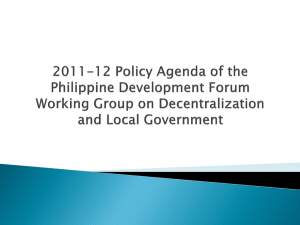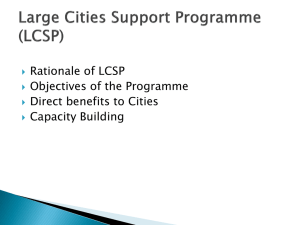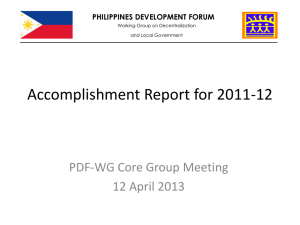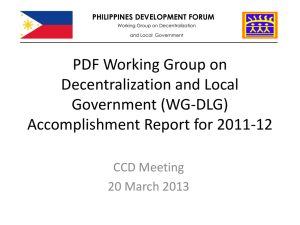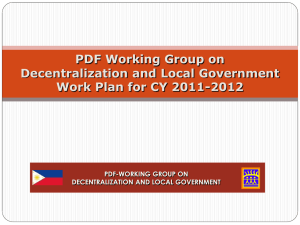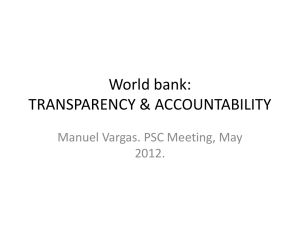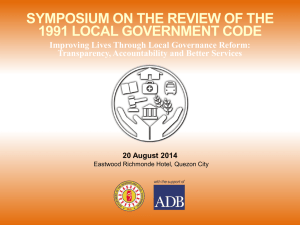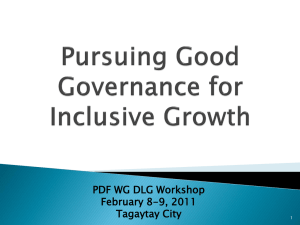review of the 1991 local government code
advertisement
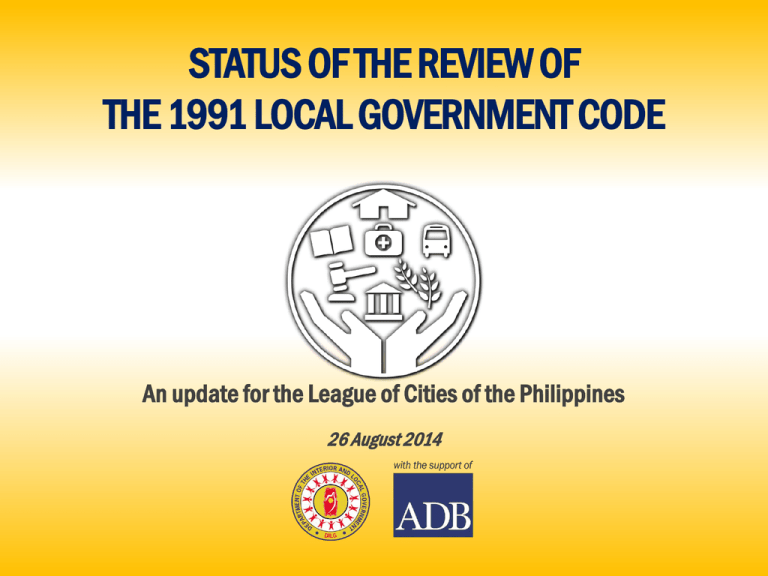
STATUS OF THE REVIEW OF THE 1991 LOCAL GOVERNMENT CODE An update for the League of Cities of the Philippines 26 August 2014 Goals of the Review Why are we reviewing the Code? Why focus on its fiscal provisions? 1. The law mandates a review of the Code every 5 years. 2. Despite recent progress in local governance reforms, various stakeholders believe that after 23 years, changes to the Code are long overdue. 3. Many fiscal topics are on the priority list of stakeholders. 4. It is important to conduct a review of the provisions using a holistic framework. REVIEW OF THE 1991 LOCAL GOVERNMENT CODE Improving Lives Through Local Governance Reform: Transparency, Accountability and Better Services Goals of the Review (cont’d) 5. The 2011-2016 Philippine Development Plan asserts that LGUs must contribute to attaining inclusive growth and reducing poverty through: Improved delivery of decentralized services Greater local revenue autonomy Strong local fiscal governance Hence, the underlying theme of the review process: Improving Lives Through Local Governance Reform: Transparency, Accountability and Better Services REVIEW OF THE 1991 LOCAL GOVERNMENT CODE How shall the review be conducted? 1 2 3 4 5 INCLUSIVE GOV’T-LED TRANSPARENT TIME-BOUND Cabinet Cluster for Good Governance & Anti-Corruption >> Wide public dissemination via mass media and online channels hopes to DEMYSTIFY and POPULARIZE the fiscal aspects of local governance EVIDENCEBASED Congress Nat’l Agencies LGU Leagues Civil Society Business Sector Citizens At Large Subject Experts Coordinating Committee for Decentralization >> Oversight Committee for Devolution Position papers Existing studies New studies Surveys Complete recommendations for legislative amendments before end-2014 3 Pillars of the Review Process 1 TAKING STOCK Related laws passed since 1991 Bills filed/re-filed in Congress Supreme Court rulings 2 FEELING THE STAKEHOLDERS’ PULSE Sectoral and regional consultations Surveys 3 PROCESSING THE EVIDENCE Technical studies Position papers Scope of the Review – 7 Fiscal Topics 1. Expenditure assignment Overlapping and unclear assignment of functions among national agencies & LGUs particularly in health, agriculture and environment & natural resources Unfunded mandates result in insufficient or even non-delivery of services to local communities 2. Revenue assignment & taxing powers Lack of productive source of local revenues ► High LGU dependence on transfers ► Weak revenue autonomy ► Weak accountability (continued) REVIEW OF THE 1991 LOCAL GOVERNMENT CODE Improving Lives Through Local Governance Reform: Transparency, Accountability and Better Services 7 Fiscal Topics for the Review (cont’d) 3. Intergovernmental fiscal transfer Is IRA sufficient for LGUs to be able to deliver devolved services? Does IRA assist fiscal equalization by giving more to LGUs with greater needs and less to those with a higher taxing capacity? Is IRA a disincentive for improving local revenue generation? 4. LGU borrowing and credit finance Low borrowings relative to financed local infrastructure Fiscal risks arising from LGU borrowings, particularly if not utilized for capital investment Preferential treatment given to government financial institutions as LGU depository banks REVIEW OF THE 1991 LOCAL GOVERNMENT CODE Improving Lives Through Local Governance Reform: Transparency, Accountability and Better Services 7 Fiscal Topics for the Review (cont’d) 5.Creation of LGUs Trend towards conversion from municipalities to cities / break-up of existing LGUs into 2 or more units: it tends to create inefficient-sized jurisdictions Need to strengthen existing provisions that regulate the creation of new LGUs 6.Inter-LGU alliances Uncertainties about how to manage common funds, access financing Vague regulatory framework and legal personality for inter-LGU cooperation 7.Fiscal administration Some Local Government Code provisions are deemed antiquated or inconsistent with certain laws that came after enactment of the Code in 1991 Review provisions re: cap on personal services expenditures, procurement REVIEW OF THE 1991 LOCAL GOVERNMENT CODE Improving Lives Through Local Governance Reform: Transparency, Accountability and Better Services Highlights of First 3 Months of the Local Government Code Review June-August 2014 REVIEW OF THE 1991 LOCAL GOVERNMENT CODE Improving Lives Through Local Governance Reform: Transparency, Accountability and Better Services 1. Presented to the 3 key committees in Congress House Committee on Local Government Rep. Pedro Acharon Jr. Senate Oversight Select Committee on the Local Gov’t Code Sen. Aquilino Pimentel III Senate Committee of Local Government Sen. Ferdinand Marcos Jr. 2. Gained the solidarity of LGU league presidents, Congress and development partners 3. Completed 1-on-1 consultations with: Six out of 9 LGU leagues Next round w/ barangay, vice-mayor & board members’ leagues Business sector Phil Chamber of Commerce and Industry National government agencies DoF DBM DOH NEDA DepEd Development partners w/ similar programs in local governance AusAID EU USAID WB AFD GIZ CIDA Consultation activities scheduled in Sept 2014 Luzon Visayas Mindanao - Sept. 11-12 Sept. 18-19 Sept. 25-26 Quezon City Cebu Davao or Cagayan de Oro Invited participants per regional consultation: Provincial governors City mayors Chapter presidents of League of Municipalities Local business, civil society, academe Anticipated participants per regional consultation: 200 REVIEW OF THE 1991 LOCAL GOVERNMENT CODE Improving Lives Through Local Governance Reform: Transparency, Accountability and Better Services Other consultation activities in Sept 2014 Continuing 1-on-1 meetings with sectors: a. Civil society organizations Nat’l officers of PRRM, CODE-NGO, LOGODEF, Galing Pook Foundation b. Academe a. UP School of Economics b. UP College of Public Administration & Governance c. Ateneo-Benigno and Corazon Aquino School of Government d. De La Salle-Jesse Robredo Institute of Governance REVIEW OF THE 1991 LOCAL GOVERNMENT CODE Improving Lives Through Local Governance Reform: Transparency, Accountability and Better Services Actions for Last Quarter of 2014 1. Inventory and processing of consultation inputs, LGU survey results 2. Submission of position papers by fiscal experts 3. Presentation of position papers to Coordinating Committee on Decentralization and all stakeholders 4. Drafting and review of proposed amendments 5. Submission of draft amendments to Congress (continued) REVIEW OF THE 1991 LOCAL GOVERNMENT CODE Thank you very much for your time and attention!
